SPECIAL REPORT: By David Robie in Taipei
It was a heady week for the Paris-based global media freedom watchdog Reporters Without Borders (RSF) — celebration of seven years of its Taipei office, presenting a raft of proposals to the Taiwan government, and hosting its Asia-Pacific network of correspondents.
Director general Thibaut Bruttin and the Taipei bureau chief Cedric Alviani primed the Taipei media scene before last week’s RSF initiatives with an op-ed in the Taiwan Times by acknowledging the country’s media freedom advances in the face of Chinese propaganda.
Taiwan rose eight places to 27th in the RSF World Press Freedom Index this year – second only to Timor-Leste in the Asia-Pacific region.
- READ MORE: RSF director general calls China’s repression of journalists ‘totally insane’
- Reporters Without Borders calls for media freedom reforms in Taiwan
But the co-authors also warned over the credibility damage caused by media “too often neglect[ing] journalistic ethics for political or commercial reasons”.
As a result, only three in 10 Taiwanese said they trusted the news media, according to a Reuters Institute survey conducted in 2022, one of the lowest percentages among democracies.
“This climate of distrust gives disproportionate influence to platforms, in particular Facebook and Line, despite them being a major vector of false or biased information,” Bruttin and Alviani wrote.
“This credibility deficit for traditional media, a real Achilles heel of Taiwanese democracy, puts it at risk of being exploited for malicious purposes, with potentially dramatic consequences.”
Press freedom programme
At a meeting with Taiwanese President Lai Ching-te and senior foreign affairs officials, Bruttin and his colleagues presented RSF’s innovative programme for improving press freedom, including the Journalism Trust Initiative (JTI), the first ISO-certified media quality standard; the Paris Charter on Artificial Intelligence and Journalism; and the Propaganda Monitor, a project aimed at combating propaganda and disinformation worldwide.
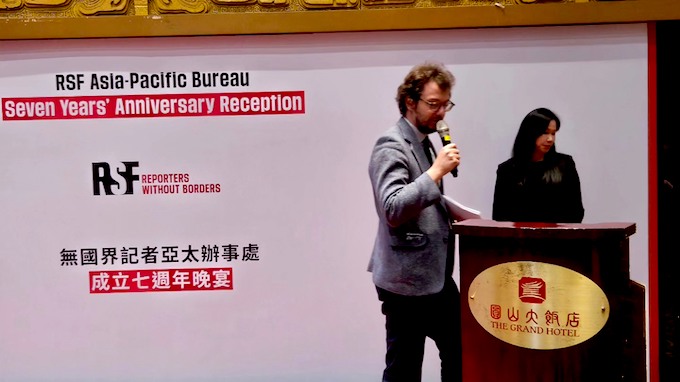
The week also highlighted concerns over the export of the China’s “New World Media Order”, which is making inroads in some parts of the Asia-Pacific region, including the Pacific.
At the opening session of the Asia-Pacific correspondents’ seminar, delegates referenced the Chinese disinformation and assaults on media freedom strategies that have been characterised as the “great leap backwards for journalism” in China.
“Disinformation — the deliberate spreading of false or biased news to manipulate minds — is gaining ground around the world,” Bruttin and Alviani warned in their article.
“As China and Russia sink into authoritarianism and export their methods of censorship and media control, democracies find themselves overwhelmed by an incessant flow of propaganda that threatens the integrity of their institutions.”
Both Bruttin and Alviani spoke of these issues too at the celebration of the seventh anniversary of the Asia-Pacific office in Taipei.
Why Taipei? Hongkong had been an “likely choice, but not safe legally”, admitted Bruttin when they were choosing their location, so the RSF team are happy with the choice of Taiwan.
Hub for human rights activists
“I think we were among the first NGOs to have established a presence here. We kind of made a bet that Taipei would be a hub for human rights activists, and we were right.”
About 200 journalists, media workers and press freedom and human rights advocates attended the birthday bash in the iconic Grand Hotel’s Yuanshan Club. So it wasn’t surprising that there was a lot of media coverage raising the issues.
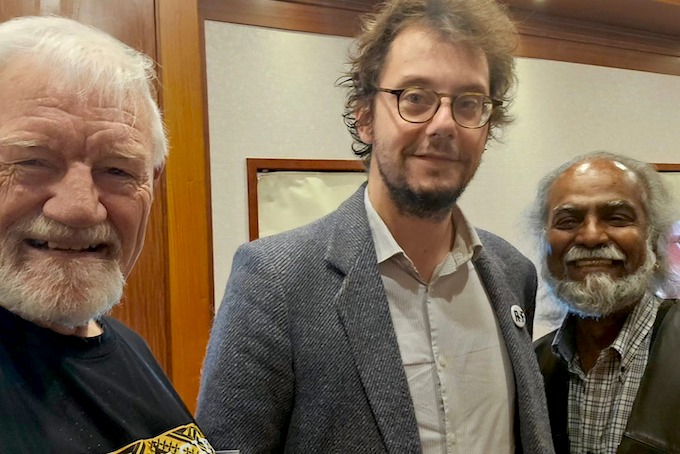
In an interview with Voice of America’s Joyce Huang, Bruttin was more specific about the “insane” political propaganda threats from China faced by Taiwan.
However, Taiwan “has demonstrated resilience and has rich experience in resisting cyber information attacks, which can be used as a reference for the world”.
Referencing China as the world’s “biggest jailer of journalists”, Bruttin said: “We’re very worried, obviously.” He added about some specific cases: “We’ve had very troublesome reports about the situation of Zhang Zhan, for example, who was the laureate of the RSF’s [2021 press freedom] awards [in the courage category] and had been just released from jail, now is sent back to jail.
“We know the lack of treatment if you have a medical condition in the Chinese prisons.
“Another example is Jimmy Lai, the Hongkong press freedom mogul, he’s very likely to die in jail if nothing happens. He’s over 70.
“And there is very little reason to believe that, despite his dual citizenship, the British government will be able to get him a safe passage to Europe.”
Problem for Chinese public
Bruttin also expressed concern about the problem for the general public, especially in China where he said a lot of people had been deprived of the right to information “worthy of that name”.
“And we’re talking about hundreds of millions of people. And it’s totally scandalous to see how bad information is treated in the People’s Republic of China.”
Seventeen countries in the Asia-Pacific region were represented in the network seminar.
Representatives of Australia, Cambodia, Hongkog, Indonesia, Japan, Myanmar, Mongolia, New Zealand, Papua New Guinea, Philippines, South Korea, Tibet, Thailand and Vietnam were present. However, three correspondents (Malaysia, Singapore and Timor-Leste) were unable to be personally present.
Discussion and workshop topics included the RSF Global Strategy; the Asia-Pacific network and the challenges being faced; best practice as correspondents; “innovative solutions” against disinformation; public advocacy (for authoritarian regimes; emerging democracies, and “leading” democracies); “psychological support” – one of the best sessions; and the RSF Crisis Response.
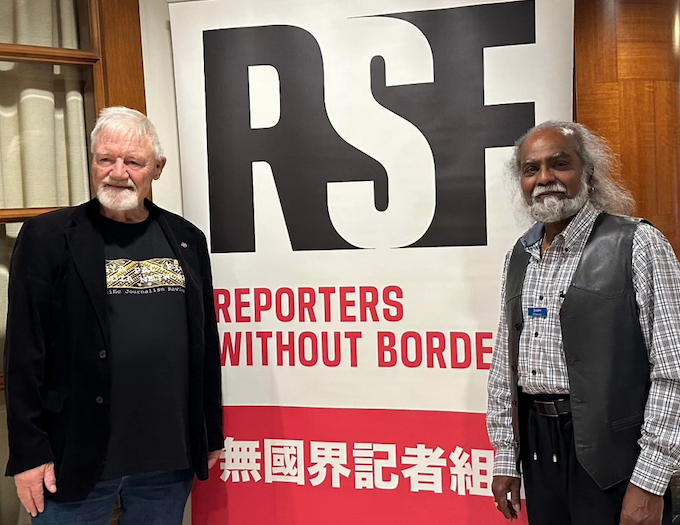
What about Oceania (including Australia and New Zealand) and its issues? Fortunately, the countries being represented have correspondents who can speak our publicly, unlike some in the region facing authoritarian responses.
Australia
Australian correspondent Dr Joseph M Fernandez, visiting associate professor at Curtin University and author of the book Journalists and Confidential Sources: Colliding Public Interests in the Age of the Leak, notes that Australia sits at 39th in the RSF World Press Freedom Index — a drop of 12 places from the previous year.
“While this puts Australia in the top one quarter globally, it does not reflect well on a country that supposedly espouses democratic values. It ranks behind New Zealand, Taiwan, Timor-Leste and Bhutan,” he says.
“Australia’s press freedom challenges are manifold and include deep-seated factors, including the influence of oligarchs whose own interests often collide with that of citizens.
“While in opposition the current Australian federal government promised reforms that would have improved the conditions for press freedom, but it has failed to deliver while in government.
“Much needs to be done in clawing back the over-reach of national security laws, and in freeing up information flow, for example, through improved whistleblower law, FOI law, source protection law, and defamation law.”
Dr Fernandez criticises the government’s continuing culture of secrecy and says there has been little progress towards improving transparency and accountability.
“The media’s attacks upon itself are not helping either given the constant moves by some media and their backers to undermine the efforts of some journalists and some media organisations, directly or indirectly.”
A proposal for a “journalist register” has also stirred controversy.
Dr Fernandez also says the war on Gaza has “highlighted the near paralysis” of many governments of the so-called established democracies in “bringing the full weight of their influence to end the loss of lives and human suffering”.
“They have also failed to demonstrate strong support for journalists’ ability to tell important stories.”
An English-language version of this tribute to the late RSF director-general Christophe Deloire, who died from cancer on 8 June 2024, was screened at the RSF Taipei reception. He was 53. Video: RSF
Aotearoa New Zealand
In New Zealand (19th in the RSF Index), although journalists work in an environment free from violence and intimidation, they have increasingly faced online harassment. Working conditions became tougher in early 2022 when, during protests against covid-19 vaccinations and restrictions and a month-long “siege” of Parliament, journalists were subjected to violence, insults and death threats, which are otherwise extremely rare in the country.
Research published in December 2023 revealed that high rates of abuse and threats directed at journalists put the country at risk of “mob censorship” – citizen vigilantism seeking to “discipline” journalism. Women journalists bore the brunt of the online abuse with one respondent describing her inbox as a “festering heap of toxicity”.
While New Zealand society is wholeheartedly multicultural, with mutual recognition between the Māori and European populations enshrined in the 1840 Treaty of Waitangi, this balance is under threat from a draft Treaty Principles Bill.
The nation’s bicultural dimension is not entirely reflected in the media, still dominated by the English-language press. A rebalancing is taking place, as seen in the success of the Māori Television network and many Māori-language programmes in mass media, such as Te Karere, The Hui and Te Ao Māori News.
Media plurality and democracy is under growing threat with massive media industry cuts this year.
New Zealand media also play an important role as a regional communications centre for other South Pacific nations, via Tagata Pasifika, Pacific Media Network and others.
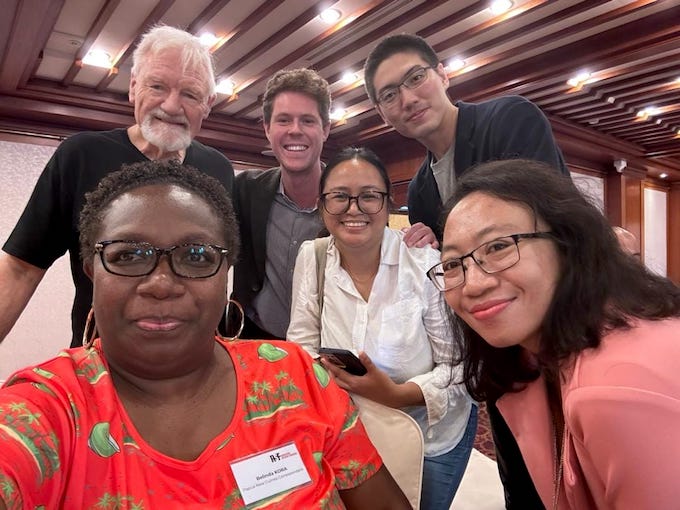
Papua New Guinea
The Papua New Guinea correspondent, Belinda Kora, who is secretary of the revised PNG Media Council and an ABC correspondent in Port Moresby, succeeded former South Pacific Post Ltd chief executive Bob Howarth, the indefatigable media freedom defender of both PNG and Timor-Leste.
Currently PNG (91st in the RSF Index) is locked in a debate over a controversial draft government media policy – now in its fifth version – that critics regard as a potential tool to crack down on media freedom. But Kora is optimistic about RSF’s role.
“I am excited about what RSF is able and willing to bring to a young Pacific region — full of challenges against the press,” she says.
“But more importantly, I guess, is that the biggest threat in PNG would be itself, if it continues to go down the path of not being able to adhere to simple media ethics and guidelines.
“It must hold itself accountable before it is able to hold others in the same way.
“We have a small number of media houses in PNG but if we are able to stand together as one and speak with one voice against the threats of ownership and influence, we can achieve better things in future for this industry.
“We need to protect our reporters if they are to speak for themselves and their experiences as well. We need to better provide for their everyday needs before we can write the stories that need to be told.
“And this lies with each media house.
The biggest threat for the Pacific as a whole? “I guess the most obvious one would be being able to remain self-regulated BUT not being accountable for breaching our individual code of ethics.
“Building public trust remains vital if we are to move forward. The lack of media awareness also contributes to the lack of ensuring media is given the attention it deserves in performing its role — no matter how big or small our islands are,” Kora says.
“The press should remain free from government influence, which is a huge challenge for many island industries, despite state ownership.
Kora believes that although Pacific countries are “scattered in the region”, they are able to help each other more, to better enhance capacity building and learning from their mistakes with collaboration.
“By collaborating in our efforts in seeking the truth behind many of our big stories that is affecting our people. This I believe will enable us to improve our performance and accountability.”
Example to the region
Meanwhile, back in Taiwan on the day that RSF’s Thibaut Bruttin flew out, he gave a final breakfast interview to China News Agency (CNA) reporter Teng Pei-ju who wrote about the country building up its free press model as an example to the region.
“Taiwan really is one of the test cases for the robustness of journalism in the world,” added Bruttin, reflecting on the country’s transformation from an authoritarian regime that censored information into a vibrant democracy that fights disinformation.
Dr David Robie, convenor of the Asia Pacific Media Network’s Pacific Media Watch project and author of several media and politics books, including Don’t Spoil My Beautiful Face: Media, Mayhem and Human Rights in the Pacific, has been an RSF correspondent since 1996.
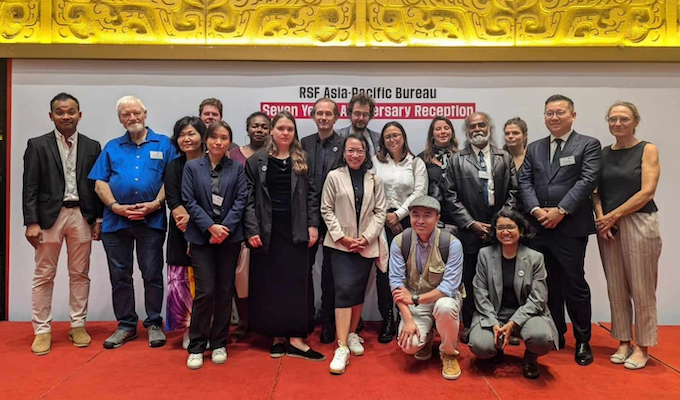
This post was originally published on Asia Pacific Report.